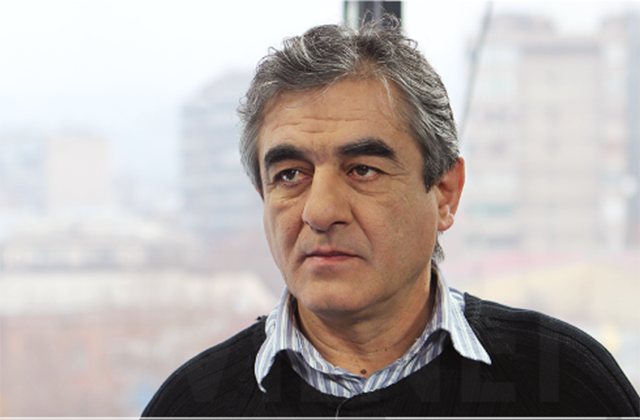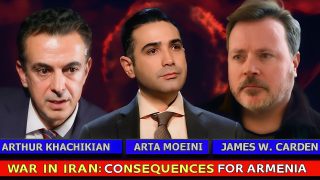“The co-chairs set forth a rather concrete condition to Armenia and Azerbaijan”

On November 8 the OSCE MG co-chairs adopted a joint statement on NK settlement, making reference to formerly introduced principles and elements. “We call on Baku and Yerevan to honor the agreements reflected in the Joint Statements of the 16 May Summit in Vienna and the 20 June Summit in St. Petersburg. We welcome the sides’ progress in implementing the exchange of data on missing persons under the auspices of the International Committee of the Red Cross. We urge the parties to remove all remaining obstacles to expanding the mission of the Personal Representative of the OSCE Chairperson-in-Office and to make progress on a proposal to establish an OSCE investigative mechanism. The proposals should be implemented together with the immediate resumption of negotiations on a settlement,” Foreign Minister of the Russian Federation Sergey Lavrov, Secretary of State of the United States John Kerry, and Foreign Minister of France Jean-Marc Ayrault stressed.
It’s rather noteworthy that despite Azerbaijan’s will, OSCE Secretary General Lamberto Zannier stated that OSCE works towards systems of investigation of ceasefire violation mechanisms. “168 Hours” interviewed Manvel Sargsyan, Head of Armenian Center for Strategic and National Research, covering the abovementioned statement, as well as tendencies in negotiations.
Mr. Sargsyan Foreign Ministers of the co-chair countries appeared with a rather comprehensive statement, reflecting to all crucial points of the settlement process—settlement elements, principles, investigative mechanisms, importance of Kasprzyk’s office expansion. To your assessment, by which was this statement important?
The most noteworthy in this statement was installation of investigative mechanisms and expansion of Kasprzyk’s office should take place in parallel with content negotiations on the settlement. Maybe many didn’t pay attention to this paragraph, but it was a rather essential observation. Why? In fact, Armenia set a condition, that Azerbaijan should fulfill the agreements reached in Vienna and St. Petersburg, which would lay ground for resumption of negotiations around the settlement.
Azerbaijan generally considers that a step to that end shouldn’t be taken as well, moreover, it denies that it agreed on creation of mechanisms, and naturally, claims, that content negotiations should be launched without any precondition. It turned out that MG co-chairs stated that these two processes should be launched in parallel. This was the formula proposed by them, at the same time—implementation of negotiations and responsibilities.
This is the news, and this is an essential circumstance, as it was expressed jointly. Not accidentally they stated that the responsible sides in this issue are Armenia and Azerbaijan, and they are ready to organize a presidential meeting when the co-chairs are ready for that. The Minsk Group has set a rather concrete condition before the parties to the conflict.
OSCE Secretary General informed that they’re working on elaboration of the mechanisms. Don’t you think that this was an important statement?
I don’t imagine installation of those mechanisms, when it wasn’t clearly stated what it supposes, it urges on creation of such a mechanism, their statement doesn’t mention mechanism. They’ve long touched upon investigative mechanisms, and now they say OSCE mechanism, i.e. this issue was also generalized. And what does this mean? Uncertainty was increased. How can it be installed unilaterally, without Azerbaijan?
On account of current posture of Azerbaijani authorities, Ilham Aliyev’s statements on return of territories, Russia-Turkey rapprochement due to which Turkey’s position has changed the negotiation process, what do you think, to which extent will OSCE succeed in urging this formula to Azerbaijan as well?
Turkey and Azerbaijan have clear and unified position, i.e. by use of current international situation, in particular, Russia-Turkey worsening condition, they strive to move forward Turkey-Azerbaijan view through Russia in NK issue, i.e. relations which Azerbaijan and Turkey intend to establish with Russia, they maximally use to strengthen their positions in NK conflict. This is a simple, clear policy, and here they had success.
Let me remind that Lavrov in Turkey linked progress in NK conflict zone with Armenia-Turkey relations. This, naturally, was Turkey’s view, any side didn’t link NK conflict to Armenia-Turkey relations, Turkey wished it. Currently they actively proceed with this policy and attempt to urge their own positions to Russia, naturally, in some zones conceding something, instead of recording success in NK. They have big hopes that they can do that.
I noticed that tendency in recent meetings as well. When Lavrov met Cavusoglu, they covered Syrian and NK conflicts, after which Turkish FM paid a visit to Baku, then Aliyev stated that they’ll “take” Armenia peacefully. To all likelihood, within those general agreements Azerbaijani president appeared with such a statement.
Will Russia-Turkey-Azerbaijan line continue, in case of which productivity of steps by OSCE aren’t generally anticipated?
With the co-chairs’ statement OSCE put the responsibility of ongoing situation on presidents of Armenia and Azerbaijan, mentioned its conditions, stated that it depends on them if the presidents are ready they’ll be willing to continue work. Now that preparation work will take place in Russia-Turkey-Azerbaijan axis, which is a part of a wider process—Russia-West, Turkey-West.
Making use of unfavorable relations with the West, Russia, Turkey and Azerbaijan attempt to shape a separate triangle and solve some issues in that format. Naturally, Armenia is in it as well, with its issues. The bothering point here is that position of the Republic of Armenia isn’t known in all these issues. By all means Armenia step by step accepts Russia’s proposal—united air-defense system, united military troop, and etc. Armenia’s position in any issue isn’t observed, also related to Russia-Turkey, Russia-Azerbaijan relations, there are no explanations.
For instance, Lukashenko stated in Baku that it supports Baku even in NK conflict. Our MFA expressed indefinite concern, there was no any note to Belarus, its issue wasn’t raised in CSTO and EEU, where it’s Armenia’s ally. This policy is becoming very dangerous. If you don’t have your own policy, you move by dictation of the other, in this case—of Russia, which is not only unacceptable, but hazardous as well.
By Araks Martirosyan

























